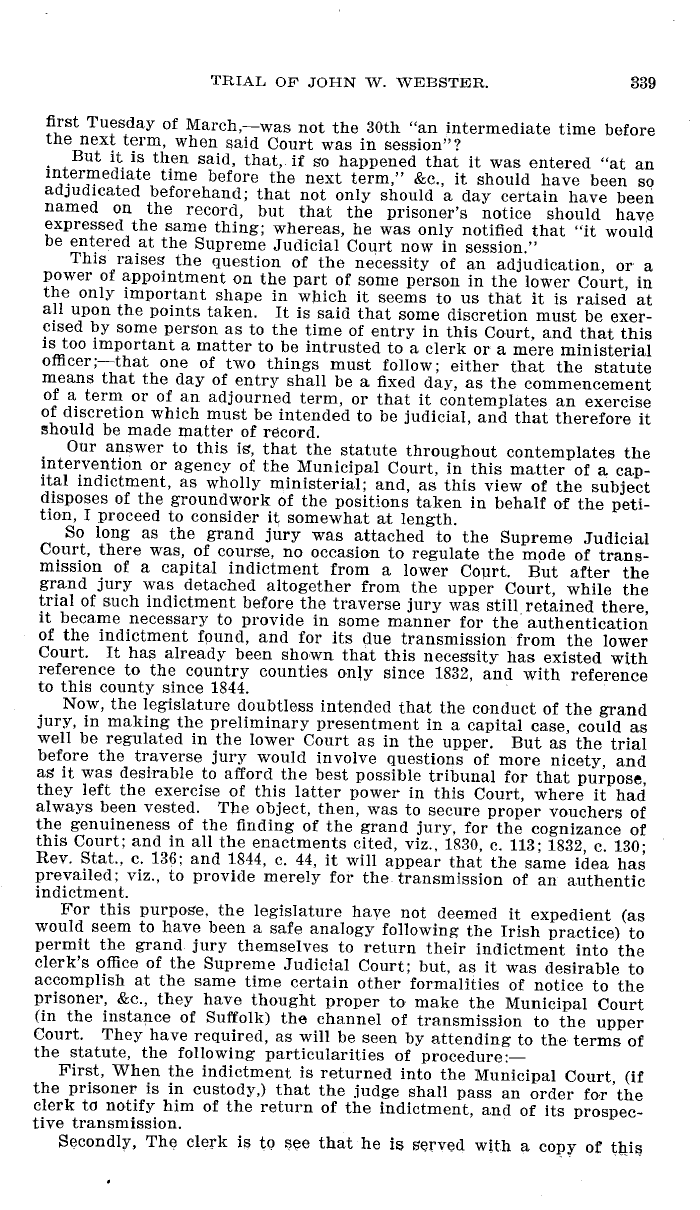|
TRIAL OF JOHN W. WEBSTER. 339
first Tuesday of March,-was not the 30th "an intermediate time before
the next term, when said Court was in session"?
But it is then said that. if so happened that it was entered "at an
intermediate time before the next term," &c., it should have been so
adjudicated beforehand; that not only should a day certain have been
named on the record, but that the prisoner's notice should have
expressed the same thing; whereas, he was only notified that "it would
be entered at the Supreme Judicial Court now in session."
This raises the question of the necessity of an adjudication, or a
power of appointment on the part of some person in the lower Court, in
the only important shape in which it seems to us that it is raised at
all upon the points taken. It is said that some discretion must be exer-
cised by some person as to the time of entry in this Court, and that this
is too important a matter to be intrusted to a clerk or a mere ministerial
officer; that one of two things must follow; either that the statute
means that the day of entry shall be a fixed day, as the commencement
of a term or of an adjourned term, or that it contemplates an exercise
of discretion which must be intended to be judicial, and that therefore it
should be made matter of record.
Our answer to this is that the statute throughout contemplates the
intervention or agency of the Municipal Court, in this matter of a cap-
ital indictment, as wholly ministerial; and, as this view of the subject
disposes of the groundwork of the positions taken in behalf of the peti-
tion, I proceed to consider it somewhat at length.
So long as the grand jury was attached to the Supreme Judicial
Court, there was, of course, no occasion to regulate the mode of trans-
mission of a capital indictment from a lower Court. But after the
grand jury was detached altogether from the upper Court, while the
trial of such indictment before the traverse jury was still retained there,
it became necessary to provide in some manner for the authentication
of the indictment found, and for its due transmission from the lower
Court. It has already been shown that this necessity has existed with
reference to the country counties only since 1832, and with reference
to this county since 1844.
Now, the legislature doubtless intended that the conduct of the grand
jury, in making the preliminary presentment in a capital case, could as
well be regulated in the lower Court as in the upper. But as the trial
before the traverse jury would involve questions of more nicety, and
as it was desirable to afford the best possible tribunal for that purpose,
they left the exercise of this latter power in this Court, where it had
always been vested. The object, then, was to secure proper vouchers of
the genuineness of the finding of the grand jury, for the cognizance of
this Court; and in all the enactments cited, viz., 1830, c. 113; 1832, c.
130;
Rev. Stat., c. 136; and 1844, c. 44, it will appear that the same idea has
prevailed; viz., to provide merely for the transmission of an authentic
indictment.
For this purpose. the legislature have not deemed it expedient (as
would seem to have been a safe analogy following the Irish practice) to
permit the grand jury themselves to return their indictment into the
clerk's office of the Supreme Judicial Court; but, as it was desirable to
accomplish at the same time certain other formalities of notice to the
prisoner, &c., they have thought proper to make the Municipal Court
(in the instance of Suffolk) the channel of transmission to the upper
Court. They have required, as will be seen by attending to the terms of
the statute, the following particularities of procedure:-
First, When the indictment is returned into the Municipal Court, (if
the prisoner is in custody,) that the judge shall pass an order for the
clerk to notify him of the return of the indictment, and of its prospec-
tive transmission.
Secondly, The clerk is to see that he is served with a copy of this
|

